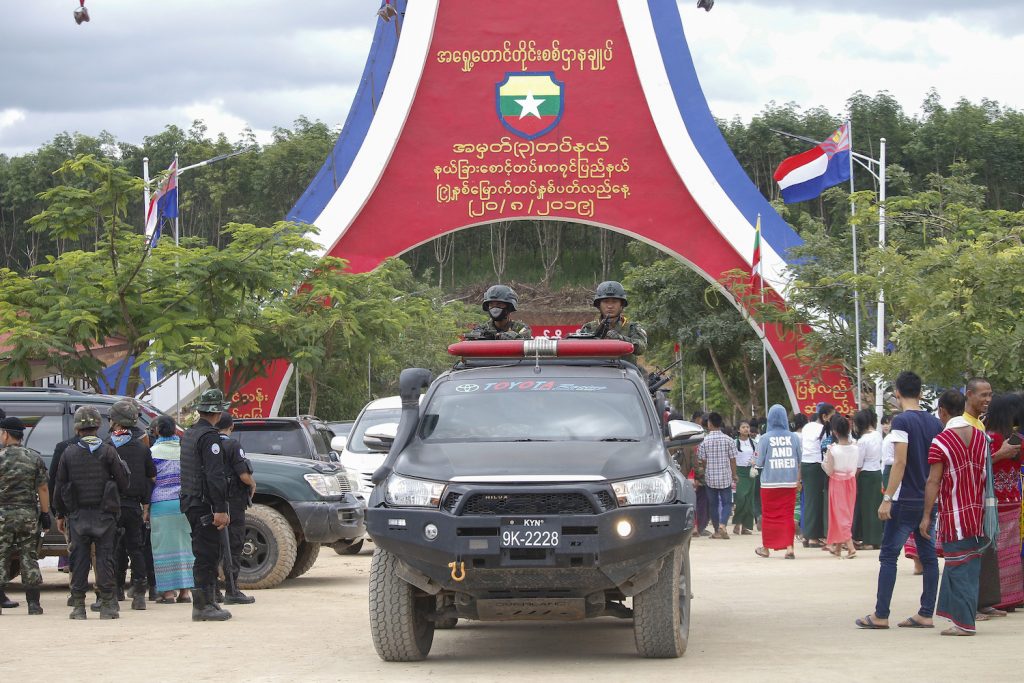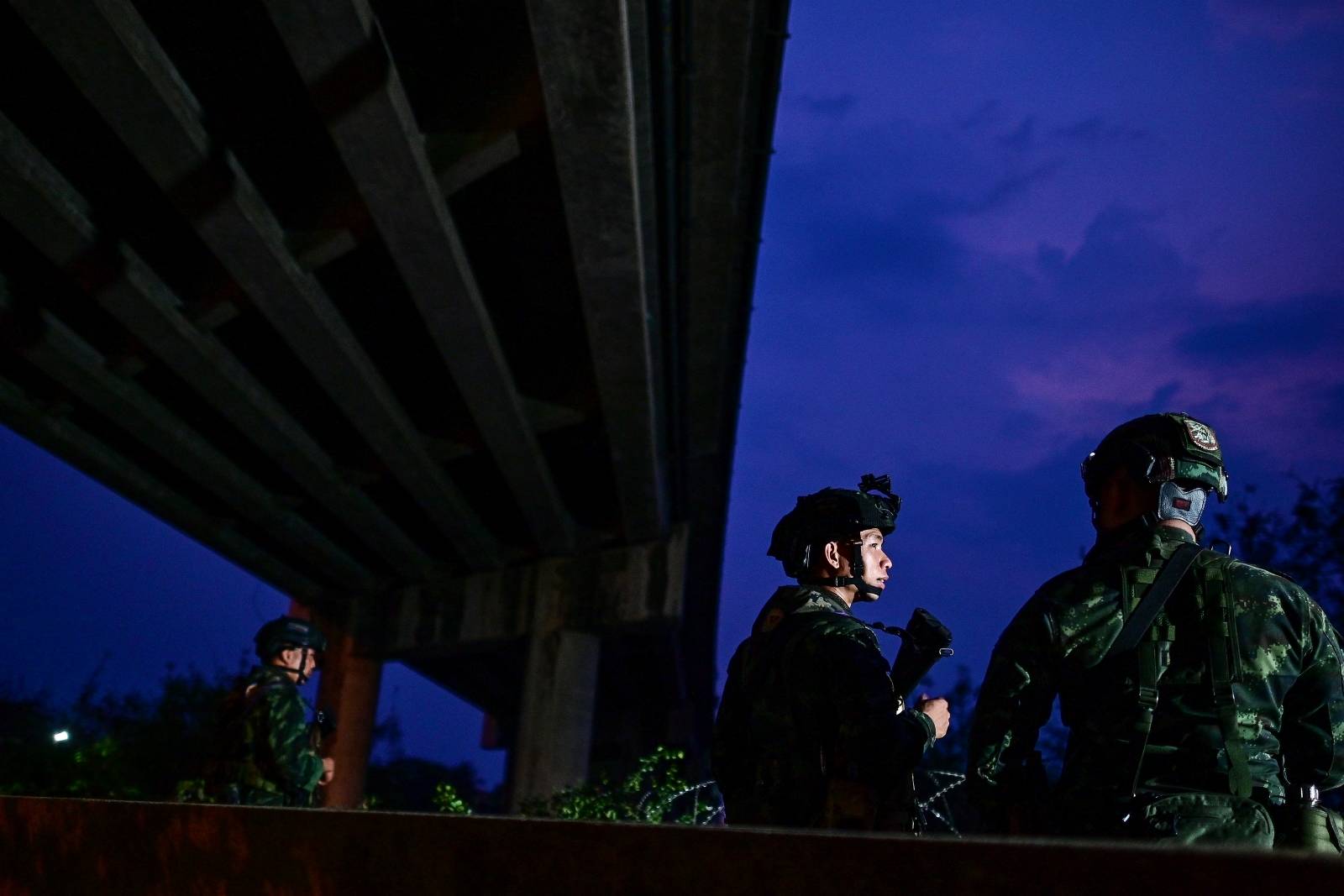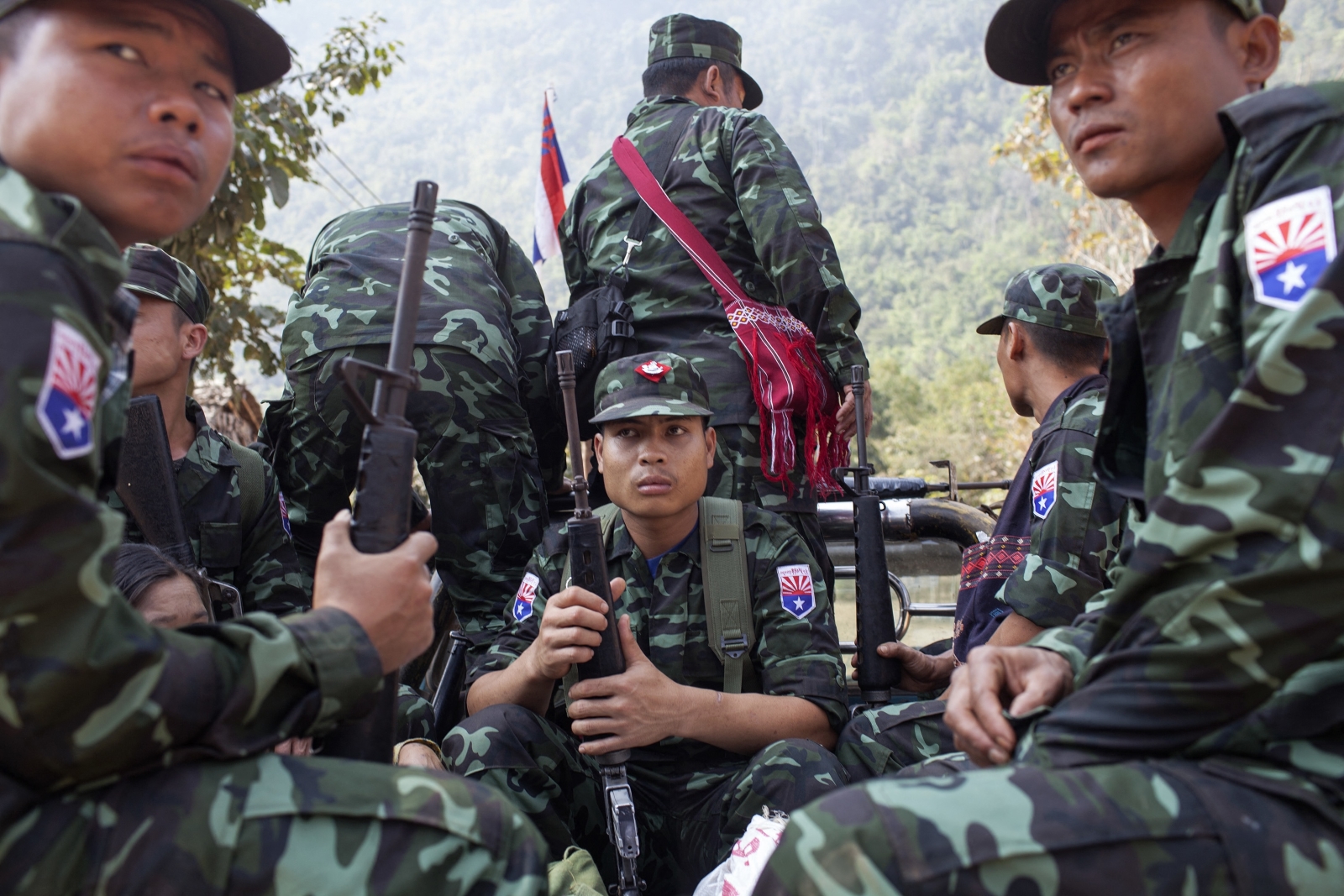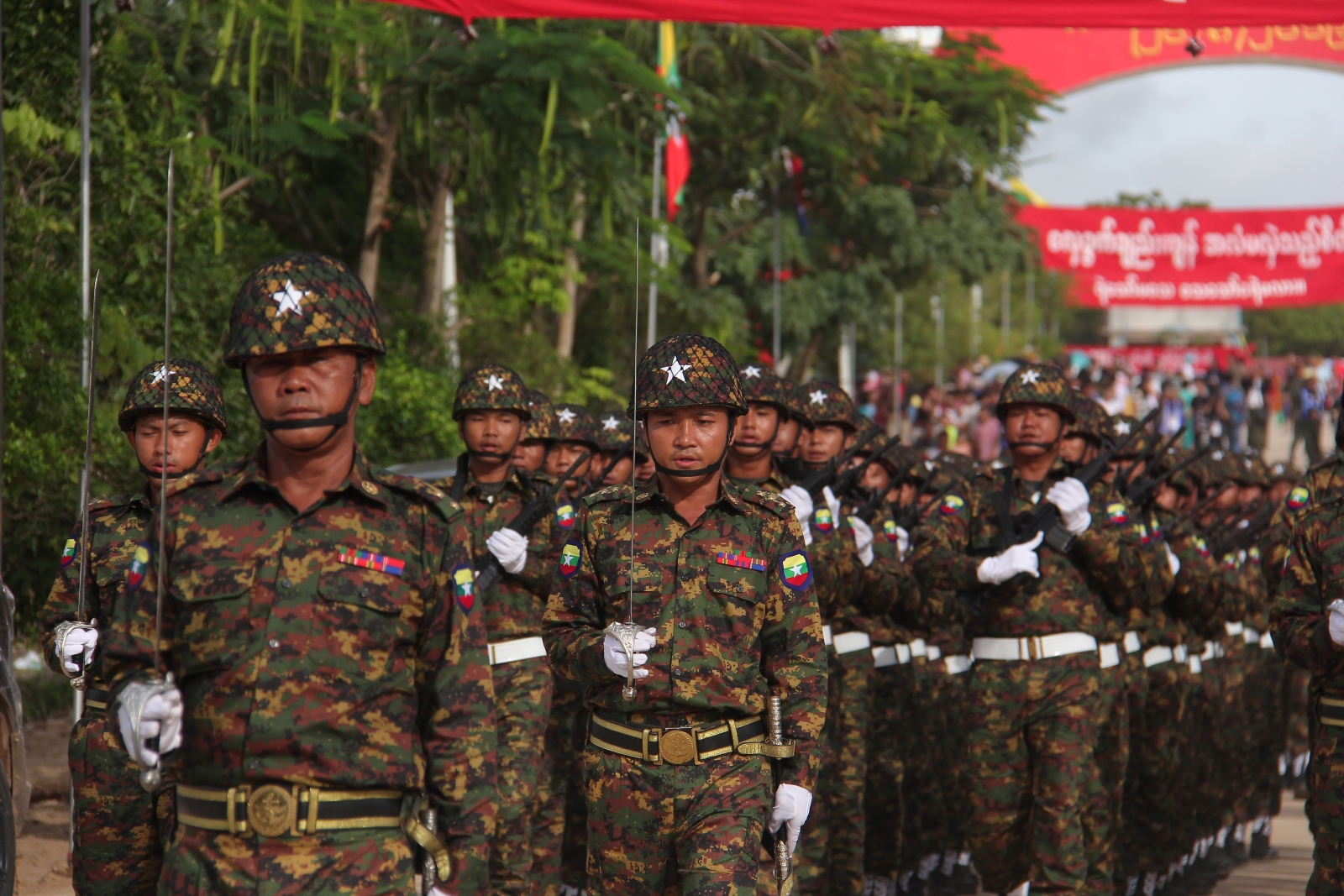The Tatmadaw has occupied the border town of Myawaddy and the Kayin State Border Guard Force has sealed off its nearby Shwe Kokko enclave as tensions rise over the group’s business empire.
By NAW BETTY HAN | FRONTIER
When U Myint Hlaing, 52, went to make his morning newspaper delivery round in Myawaddy on December 10, he was confronted by something unusual: a Tatmadaw checkpoint.
Normally the Kayin State Border Guard Force manages security in Myawaddy, which sits opposite Thailand’s Mae Sot on the Thaung Yin (Moei) River.
But as he went door-to-door around the Kayin State border town that morning, Myint Hlaing noticed Tatmadaw soldiers manning more than a dozen new checkpoints around town. Many of the existing BGF-run checkpoints now also had Tatmadaw soldiers, he added.
“Checkpoints have been established at every main intersection this week,” he told Frontier on December 21.
Shortly after the checkpoints were set up, the police and the Tatmadaw seized 147 unlicensed vehicles from the BGF in joint raids at various addresses in Myawaddy on December 11 and 12.
The seizures have raised fears of clashes between the Tatmadaw and the heavily armed BGF, which is formally part of the Tatmadaw but operates with a significant degree of autonomy, particularly in its business ventures. “Some people wonder if the Tatmadaw might take back control over the BGF’s territory,” Myint Hlaing said.

Rise of a business empire
The Kayin BGF was established in 2010 when most of the Democratic Karen Buddhist Army, which had broken away from the Karen National Union in 1994, accepted Tatmadaw demands to come under its control.
The BGF is based at Shwe Kokko, about 20 kilometres north of Myawaddy town, and is led by Colonel Saw Chit Thu, a former DKBA operations commander who is now senior adviser and general secretary of the Kayin State BGF central command.
The BGF and its DKBA precursor have been involved in illicit businesses along the border with Thailand for decades, controlling dozens of informal trade gates through which hundreds of millions of dollars of goods pass each year.
But the group has attracted attention more recently for its partnership to develop a massive project, the Yatai New City, at its base in Shwe Kokko on the border with Thailand. The developer has described the project, being jointly implemented by Bangkok-based company Yatai International, as a US$15 billion “smart city” that will complement China’s Belt and Road Initiative. However, critics say the project is a front for criminal activity, particularly online gambling targeting Chinese nationals, and Chinese outlet Caixin revealed in October that the ethnic Chinese owner of Yatai, Mr She Zhijiang, is a fugitive in China. (Read Frontier’s expose on the man and his Southeast Asian business empire here.) Much of the construction work to date on the Yatai New City project has also been undertaken without the necessary government permits.
The BGF has also been linked to a string of new casinos in Myawaddy on the western bank of the Thaung Yin. Built with Thai and Chinese investment, these casinos operate in apparent contravention of the Gambling Law, and cater to locals and visitors who cross from Thailand. They also appear to be a haven for online gambling operators. Thousands of skilled workers from China have been smuggled in to work at the BGF’s various joint ventures, sparking local anger.
Rumours of tensions between the Tatmadaw and the BGF over these business activities began spreading in Myawaddy Township after the government announced in June that it had formed a panel to investigate irregularities surrounding the Yatai New City project.
The Tatmadaw has since revealed it is investigating several of its own officers in Kayin State for bribery in connection with Yatai New City. The Chinese embassy has also taken the unusual step of issuing a statement to distance itself from the project.
Multiple sources told Frontier that the Tatmadaw had also ordered the BGF to halt all activity at the project site earlier this month.
Myint Hlaing said the rising tensions between the Tatmadaw and BGF, the buildup of forces and the recent car seizures had created alarm in Myawaddy, with residents worried about the possibility of fighting erupting in the area.
Officially, though, the extra security is due to recent fighting between the Tatmadaw and Brigade 5 of the Karen National Liberation Army, the armed wing of the KNU, in Kayin State’s Hpapun Township, about 300 kilometres to the north of Myawaddy.
“The extra troops were deployed in and around Myawaddy Township for security reasons because of the recent clashes with the KNLA,” said U Tay Zar Aung, the administrator of Myawaddy Township.
Several clashes have been reported since the start of December in Hpapun, most recently at Mae Wai on the morning of December 15 when the KNLA fired on the Tatmadaw and some soldiers were injured. Both sides have accused the other of violating the Nationwide Ceasefire Agreement, which the KNU signed with the government in 2015.
However, U Kyaw Soe, the administrator of Natshinnaung 4 ward in Myawaddy, said he doubted the official reason. He said that the “joint” security operation in Myawaddy looked more like a Tatmadaw takeover: the Tatmadaw has assigned troops to the seven checkpoints the BGF previously manned exclusively, and had also set up another 15 or so checkpoints around town.
“Although we were told that the reason for the extra checkpoints was the clash at Hpapun, I think there is something else going on,” Kyaw Soe said.

Shwe Kokko in lockdown
The BGF has responded to the Tatmadaw’s move in Myawaddy by beefing up security around its territory in Shwe Kokko to the north of the township.
Kyaw Soe said friends in Shwe Kokko had told him the BGF had imposed a travel ban on residents from December 15, with no one allowed to enter or exit the BGF-held area.
With its security arrangements, the BGF “seemed to be preparing for some kind of fighting”, he added.
Saw Tin Shwe, who lives in Shwe Kokko, confirmed that the BGF had increased troop numbers in the area in early December when work on the Yatai New City project was halted.
“I used to travel to Myawaddy town once a week to deliver fruit from my orchard to the market, but the road has been closed since the first week of December,” Tin Shwe said on December 19. “I heard from BGF members that the Tatmadaw planned to remove the BGF from Shwe Kokko and the group has refused to comply.”
Tin Shwe said the BGF had promised to re-open the Shwe Kokko area when the security situation improves, but had not explained its security concerns to residents.
Although residents are not allowed to leave, the BGF has allowed government officials to visit Shwe Kokko, he said. Since the investigation was announced in June, a joint government team comprising immigration, police and General Administration Department officials has been visiting Shwe Kokko twice a month.
Tin Shwe said there were still some Chinese workers living at the project site and residents had been told that government officials would arrange for them to return to China soon.
BGF spokesperson Major Naing Maung Zaw confirmed that the BGF had halted all construction work on the Yatai New City project on December 21 after receiving an instruction to do so from the Tatmadaw.
However, Naing Maung Zaw insisted the Tatmadaw and BGF had jointly increased security in Myawaddy Township, including Shwe Kokko, because of the clashes in far-off Hpapun, and not because of anything the BGF had done in the vicinity.
“The Tatmadaw might have reasons linked to what happened at Mae Wai in Hpapun District,” he said. “But that’s all I want to say.”
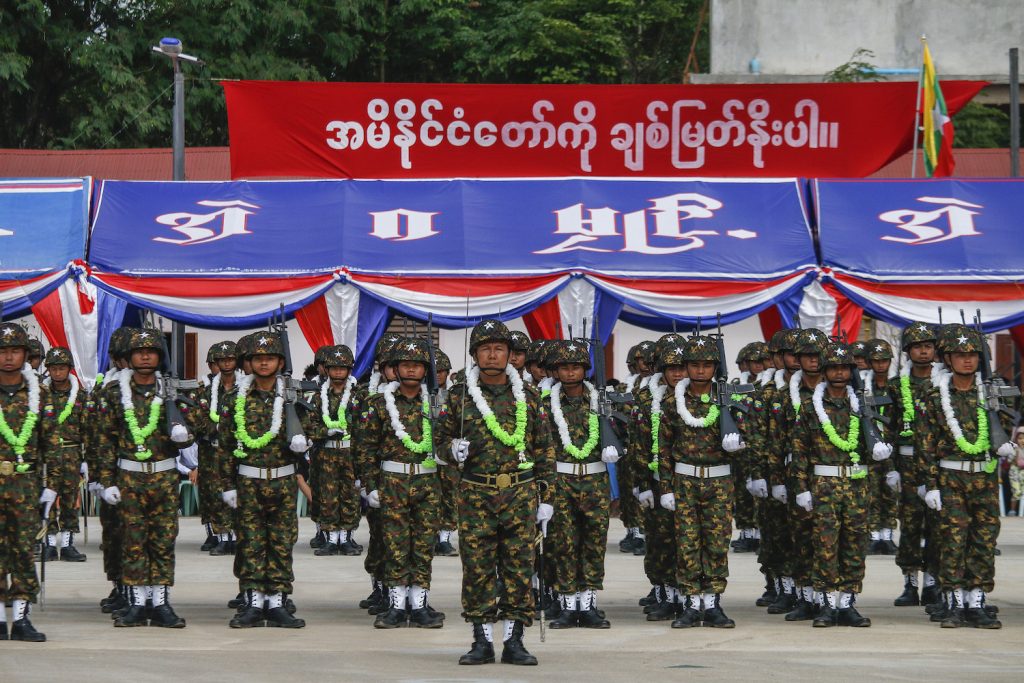
‘Mutual trust has been severely damaged’
But another BGF source, who requested anonymity, said the armed group was alarmed at the Tatmadaw’s decision to send troops into Myawaddy, particularly as it had not informed the BGF in advance.
“They [the Tatmadaw] did everything very secretly – they didn’t tell the BGF what they were doing in and around the town,” he said. “I heard they also wanted to deploy troops in the Shwe Kokko area but they did not admit that when we asked.”
A focus of the Tatmadaw’s attention in Myawaddy seems to be the casinos on the river opposite Mae Sot. The new Tatmadaw checkpoints have been set up close to the casinos, which normally house thousands of Chinese workers.
But the anonymous BGF source said focusing on the casinos was just a cover for the Tatmadaw’s desire to remove the BGF and replace it with its own forces. He said this would give the Tatmadaw greater military and economic control over Kayin State, and also resolve the Yatai New City scandal before the civilian government gets too involved.
“They are looking for faults in the BGF, which is why they blame it for the casinos in Myawaddy,” he said.
The source warned that the move could lead to clashes between the Tatmadaw and BGF.
“Mutual trust has been severely damaged and if the Tatmadaw keeps going like this then fighting may return to the area,” he said. “We don’t mind if our investments fail, but we have to protect our dignity. Their intention is to replace the BGF with their troops and if that happens we will not be able to stay … This could get much bigger.”
Kayin State MP U Aik Kyan Kham (National League for Democracy, Myawaddy-1), whose constituency encompasses Shwe Kokko, said the NLD-led state government had also been largely in the dark about the Tatmadaw’s decision to set up checkpoints around the town.
He added that the Tatmadaw had also wanted to establish new checkpoints along the road from Myawaddy to Shwe Kokko but the BGF had objected.
Meanwhile, Aik Kyan Kham said Tatmadaw commander-in-chief Senior General Min Aung Hlaing was said to be planning to visit Myawaddy at the end of December.
Frontier could not reach military spokesperson Brigadier-General Zaw Min Tun to confirm the Tatmadaw chief’s visit. Maung Zaw from the BGF said he had also heard about the visit but could not confirm it.
“The Tatmadaw troops were deployed in the township for security reasons after the Hpapun clash,” Aik Kyan Kham said, repeating the official line that few seem to believe locally. “But I heard they might stay on for [Min Aung Hlaing’s] security.”


